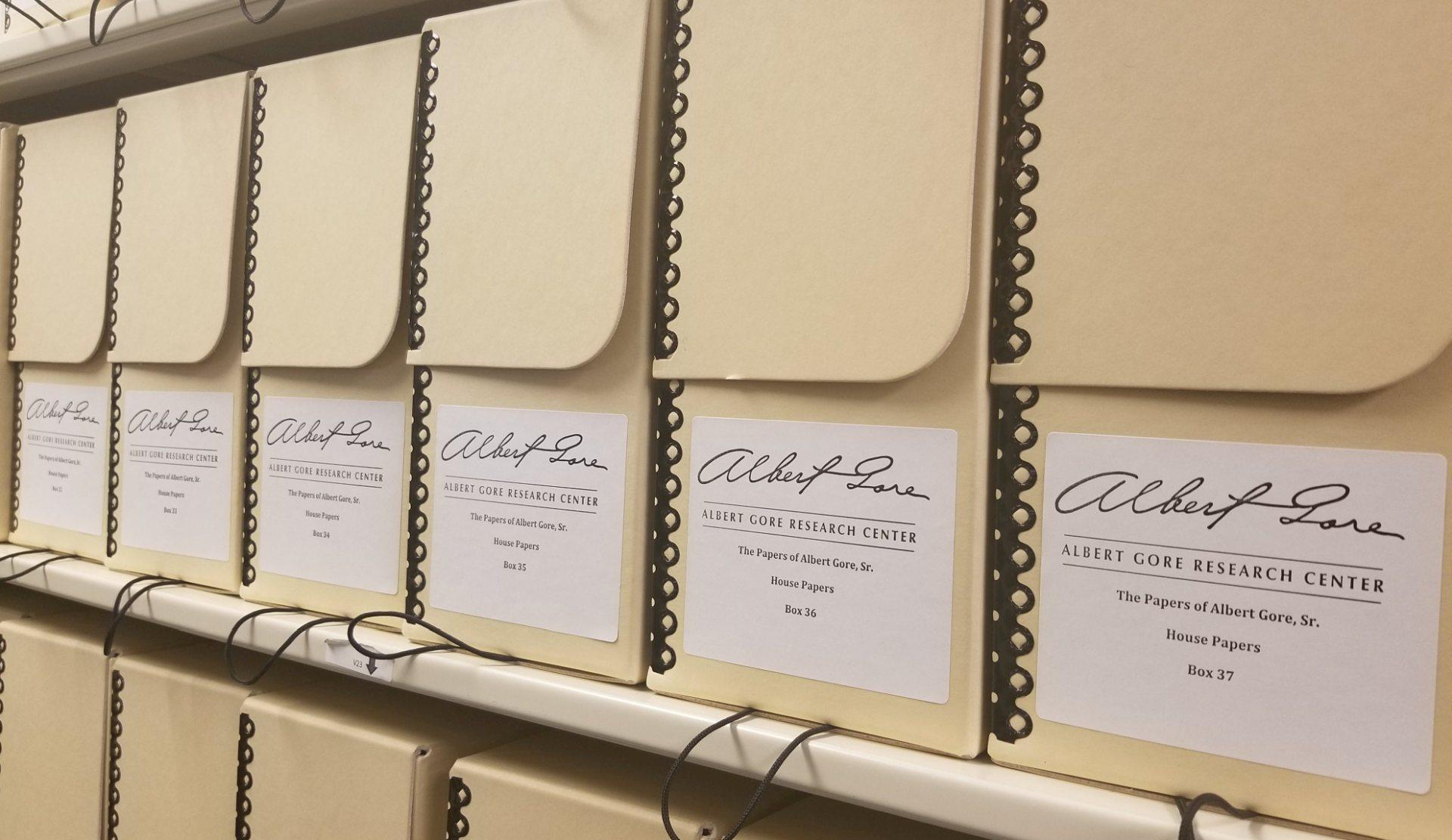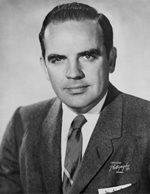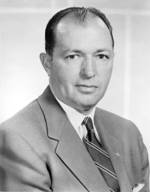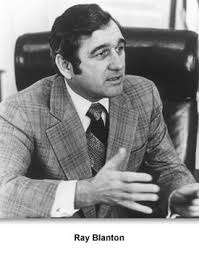Albert Gore Research Center
The History of Political Songs and Jingles in Tennessee
The Evolution of Political Jingles in Tennessee
Combine Tennessee’s colorful political history and its rich musical heritage and what happens? Catchy recordings of country and pop music stars advocating their favorite candidate for state or federal offices. How could it be any different in a state capital known as Music City USA? As they made their way into American popular culture, it should not be surprising that songs and jingles could be heard on Tennessee airwaves, too, during election years. Surviving recordings indicate a modest start in the mid-twentieth century. Then the use of songs in campaigns swelled dramatically in the Watergate era of the 1970s. As media and pop culture evolved thereafter to other forms of communication, jingles seemed as quaint as listening to the Opry on a battery-powered radio on the front porch.
What follows are examples of the ways in which office seekers made use of the creative talent in Tennessee to write and record campaign songs. Usually cheerful and positive but sometimes parodies with sinister undertones, the songs reflect changing cultural norms and political strategies.
The Early Years of Leap-Frogging Governors
In 1956 Tennessee switched terms of office for governors from two to four years. However, no one could serve more than one four-year term consecutively. Therefore, with state government firmly in the hands of the Democratic party, from 1954 to 1970 Frank Clement and Buford Ellington “leap-frogged” over one another, serving one term then staying out a term while the other served.
Frank Clement
Frank Clement (1920-1969) was born in Dickson, Tennessee, and had an interest in leadership and politics from an early age. Clement himself remarked that at the age of ten he had told his classmates that he would “run the state.” Clement also began taking speech training during his youth, a skill that would serve him well over the course of his political career. Clement attended law school and worked briefly for the FBI before establishing his own law practice. His political career began in 1953 when he became governor of Tennessee. He delivered the keynote address to the Democratic National Convention in 1956 and was seen as a rising star of the party. He served a third term as governor from 1963 to 1967. After an unsuccessful bid for the U.S. Senate against Howard Baker in 1966, Clement practiced law. Shortly after announcing his bid for a fourth term as governor in 1969, Clement died in car crash in Nashville.
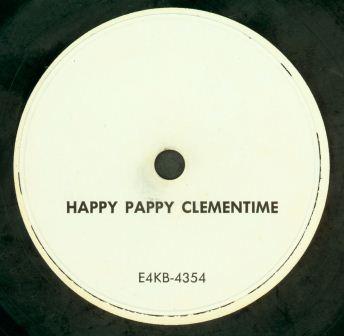
of the process of song writing and recording for political campaigns, the record label contains little
information, as well as a misspelled “Clementine.”
While we have not yet found any surviving Clement campaign jingles, there are examples of topical songs about the politician. The first, “Happy Pappy Clementine”, was an anti-Clement record apparently released during Clement’s run for governor in 1954, when former Governor Gordon Browning (whom Clement had defeated two years earlier) “accused Clement and his father of ‘peddling’ state influence” (wikipedia entry for Frank Clement). The song also makes an offhand reference to Senator Albert Gore Sr.
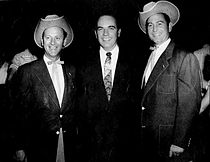
Johnnie Wright and Jack Anglin in 1957.
In spite of the early controversy in his first term, Clement quickly gained a reputation as a just and godly leader, as evidenced in “What About Frank Clement” from The Prisonaires. As reported by MTSU professor John Dougan in his book about the group titled The Mistakes of Yesterday, the Hopes of Tomorrow, having benefitted from Clement’s sweeping prison reform programs, the Prisonaires were able to record music and give performances across Tennessee while still incarcerated. Ultimately, they became Clement’s favorite group, frequently playing at the governor’s mansion and were best known for “Just Walkin’ in the Rain”.
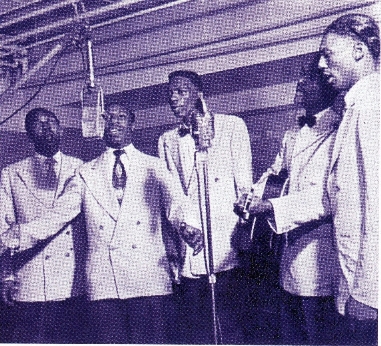
Image Courtesy MTSU’s Center for Popular Music
Sun Records: The Blues Years, 1950–1956
Item ID: RDE-007868c
By 1962, the snappy “Ballad of Frank Clement” testified further to Clement’s reputation and the positive image of “sunny Tennessee” being projected to the nation. With Cowboy Copas as lead singer, the song was re-issued in memory of Clement shortly after he died in 1969.
Buford Ellington
Buford Ellington (1907-1972) was a two-term governor of Tennessee who had served as Frank Clement’s campaign manager and commissioner of agriculture. A Democrat, Ellington was originally from Holmes County, Mississippi, but later relocated to Marshall County, Tennessee, his wife’s home county. Ellington worked as a farmer and also owned a store in Verona, Tennessee, but he soon became an important figure in Democratic politics beginning in the late 1940s.
Ellington began his first stint as governor in 1959. During his first term, he acted on his strongly held opinions of fiscal conservatism by not raising taxes while also eliminating a number of state departments. He was also a firm segregationist at this time. During his second term (1967-1971), Ellington had relaxed his original opinions regarding race but maintained his strong conservative views on economic issues.
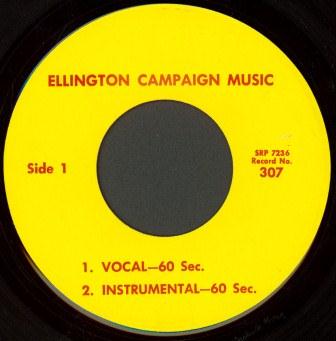
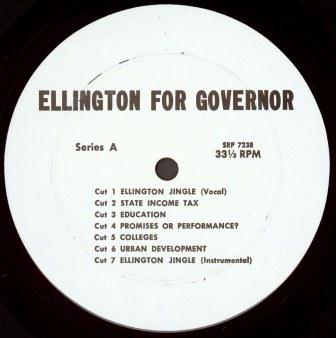
The jingles represented here date from Ellington’s second run for governor. Interestingly, Ellington did not face a Republican opponent in this race but rather ran against three independent candidates.
John Jay Hooker
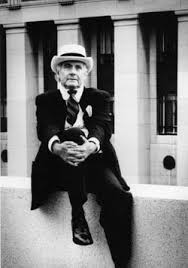
John Jay Hooker (born 1930) is a Nashville native from a family that has long been prominent in politics and leadership in Tennessee. Hooker graduated with a law degree from Vanderbilt University in 1957 and opened his own law firm in 1958. He began his political career shortly thereafter while working on the 1960 Kennedy/Johnson presidential campaign as the National Director of Professional Men and Women. Hooker’s first run for office was in 1966 when he ran against Buford Ellington in the primary for the Tennessee governorship. Hooker lost that primary race to Ellington, but he later succeeded in gaining his party’s nomination for governor in 1970 although he lost to Republican Winfield Dunn in the final election. In 1976, Hooker ran unsuccessfully in the primary for U.S. Senate against James Sasser.
The first example of John Jay Hooker jingles dates from his 1966 primary race against Ellington. To listen, click here.
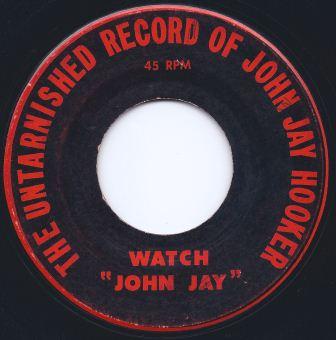
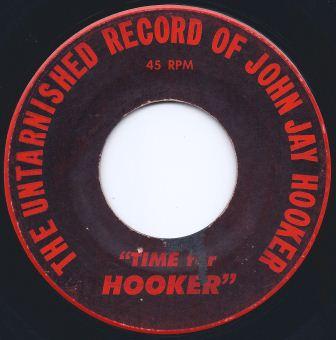
Hooker’s “Vote for Hooker” and “Time for Hooker” used different variations of the same basic melody with vocal and instrumental cuts as well as 30-, 45- and 60-second spots. They are based on the Ray Conniff record at the time called “Happiness Is”.
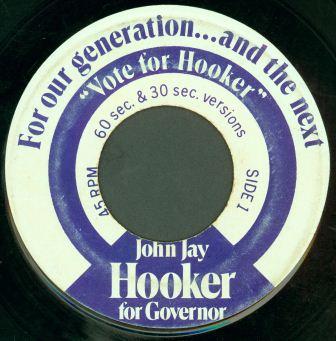
Keeping up with pop culture, Hooker’s campaign by the time of his 1976 bid for the U.S. Senate adapted the earlier “Vote for Hooker” jingle now with a disco soundtrack to appeal to the tastes of an urban audience.
The Golden Age of Political Songs in Tennessee
Ironically, while the nation was embroiled in social and political turmoil that spilled over from the late 1960s into the early 1970s, Tennessee entered a “golden age” of political songstering. Big stars lent their talents and voices to several candidates and capitalized on their hits and fame in support of candidates for statewide office. If your only source about Tennessee politics in 1974 was jingles, you would think the state’s leaders were unquestionably virtuous and that Tennesseans were headed for years of prosperity. However much they inspire listeners now to sing along karaoke style, the campaign songs of the 1970s could not mask an era of corruption and disappointment in America’s politicians.
Winfield Dunn

After defeating John Jay Hooker in the gubernatorial contest in November, Dunn broke the fifty-year Democratic monopoly on the office. WSM-TV personality Huell Howser captured Dunn singing “Lovesick Blues” with Hank Williams Jr. at his inaugural ball on January 16, 1971. The video is preserved in the Howser papers at the Albert Gore Research Center.
Country Music Queens Face Off in the Democratic Primary for Governor in 1974
Billboard on August 3, 1974, reported from Nashville that the crowded primary election for Tennessee’s governor “has swelled the coffers of the music industry with dollars.” This and other elections across the nation had “resulted in scores of sessions” in the city’s recording studios. “Perhaps the most unusual approach,” the story continued, “is that of Audio Designers, a firm here specializing in political jingles. Because of a ‘trend’ across the country, it actually is syndicating a political jingle package. What it says basically is: ‘this is the year for grass roots candidates. I’m new to the political arena. Let’s toss out the politicians.'”
Audio Designers employed “nine musicians and seven singers on the spots, including recording artist Ed Bruce and Lea Jane Bernadi,” Billboard reported. “Audio Media, a studio specializing in jingles, has done a series, mostly for candidates at the state level, and at least one at the federal level, through their Odyssey Productions.” Another Nashville company, Spotland Studios, was noted for “considerable over-dubbing of voice tracks of commercials recorded elsewhere.”
Interestingly, Billboard suggested that RCA was not jumping on the jingle bandwagon with “most of the studios of Nashville” that had “done considerable work” on jingles. “‘We won’t do anything political here,’ said Cal Everhart, studio manager. ‘It’s not that we’re against politics, but events of the past have shown that it’s sometimes hard to collect, particularly from a loser.’ This year there will be an unusually large number of losers,” the article concluded.
If you have any information about these studios, musicians, singers, or recorded jingles from the 1974 elections, please contact Kent Syler at the Gore Research Center. We are actively seeking more information to add to this exhibit.
Tammy Wynette “Stands By” Tom Wiseman
One of the eventual losers in the 1974 elections was Tom Wiseman (born 1930). He sought the 1974 Democratic nomination for governor in a particularly crowded field against Jake Butcher and the eventual victor Ray Blanton (see below). In his efforts to stand out with voters, Wiseman enlisted one of the most famous voices in the history of country music: Tammy Wynette. She adapted her most famous song, “Stand By Your Man,” to create three different sixty-second spots for Wiseman. “One of the highlights of the campaign Billboard noted on August 3, 1974, was “a Billy Sherrill-produced session with Tammy Wynette doing a parody version of ‘Stand By Your Man.'”
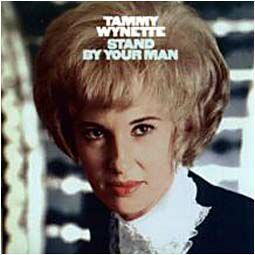
Though not really a parody, it does seem an odd choice to adapt to a campaign song in support of a man. Beginning with “sometimes it’s hard to be a woman,” the song is hardly an anthem of women’s liberation. In fact, the first minute of “Stand” is a litany of the challenges Wynette (and women generally) face in their relationships, and is followed by the sort of defense of dysfunctional relationships that has made the song a lightning rod in gender politics since it hit the charts. (Recall the flap Hillary Clinton got herself into during the 1992 presidential campaign when she said in a 60 Minutes interview, “I’m not sitting here some little woman standing by my man like Tammy Wynette.”) Just before the famous chorus, the song sighs, “after all, he’s just a man.” Listen to the original song before sampling the versions adapted to support Wiseman’s run for governor.
The first version gets right to the point in supporting Wiseman, “one good man,” asking Tennesseeans to show the nation how to address issues such as education and inflation.
The second is directed at women and presents Wiseman as one of the good men to stand by in the election.
The third is the most personal as Wynette sings, “Tom Wiseman’s sure the one for me.”
Ultimately, Wiseman did not get the nomination. He has had a lengthy career in public service. He currently serves a senior judge of the United States District Court for the Middle District of Tennessee.
Ray Blanton Counters with Dottie West’s Hit “Country Sunshine”
Ray Blanton (1930-1996), a Democrat, has the dubious honor of being listed as one of Real Clear Politics “10 Most Corrupt Politicians.” Blanton grew up on a farm in Adamsville, Tennessee, and later attended the University of Tennessee. He began his political career in 1964 when he was elected to the Tennessee State House of Representatives. He later enjoyed three terms as a U.S. Congressman. Declaring that “Ray Blanton knows a better way” than deadlocked partisan politics, this catchy jingle dates from Blanton’s unsuccessful run against Republican Howard Baker for U.S. Senate in 1972.
In the crowded race for the Democratic nomination for governor in 1974, Blanton countered Tom Wiseman’s endorsement by Tammy Wynette with one of his own by country star Dottie West, who was enjoying the popularity of her song “Country Sunshine” released the year before and covered in a Coca-Cola TV ad that blends the “country sunshine” theme with Coke’s tagline “it’s the real thing.” West adapts “Country Sunshine” again as “Ray of Blanton Sunshine” for Blanton’s campaign for governor.

As detailed in MTSU alumnus and Nashville journalist Keel Hunt’s recent book Coup: The Day the Democrats Ousted Their Governor, Put Republican Lamar Alexander in Office Early, and Stopped a Pardon Scandal, Blanton’s fall from grace began during his governorship when he was accused of selling pardons to prisoners for cash. For the only time in American history, state leaders took action to remove a governor from office and install his successor before the scheduled inauguration. In 1981, Blanton was convicted of conspiracy and extortion and served almost two years in federal prison. Following his release from prison, Blanton was a radio host and car salesman and also spent considerable effort trying to repair his damaged reputation.
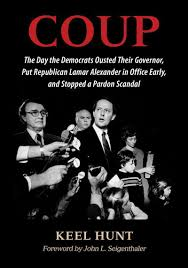
As “Weird Al” Yankovic brought parody songs to a new generation of Americans in the early 1980s, the Blanton scandal must have been irresistible to Nashville songwriters. “Pardon Me Ray” was a biting parody of “Chattanooga Choo Choo” by Brian Blue Christie and the Gitch Your Own Band that attacked Blanton’s practice of selling pardons to convicts.

Jake Butcher

Having lost in the Democratic primary in 1974, Knoxville World’s Fair promoter Jake Butcher won the nomination for governor in 1978. In 1974 our information suggests that Isaac Hayes and Barry Manilow performed jingles for Butcher, though we have not yet procured copies of the jingles. In 1978 Butcher enlisted the services of lyricist Marty Panzer to create a jingle for his run for governor. The jingle emphasized Butcher as “an honest man.” (This song has not yet been found, either.) Butcher was later convicted of bank fraud and given a twenty-year sentence in prison.
The Decline of Jingles in Tennessee Politics
Presumably music will always play some role in Tennessee politics, at the very least as background songs at campaign rallies to pump up the enthusiasm of supporters or as the entertainment at fundraising events. But since the tumult of the 1970s, campaign songs have played a less prominent role. Stars like Dottie West may have learned the lesson of backing a candidate who later turns out not to have been “a ray of sunshine” for Tennessee after all. New media choices and cultural tastes certainly play a role, too, as television and radio ads turn negative to keep the attention of evermore distracted voters.
Lamar Alexander
Lamar Alexander (born 1940) has had a lengthy record of public service having been the secretary of education in the George H.W. Bush administration, governor of Tennessee, and president of the University of Tennessee. Alexander studied law in college and landed his first legal position in 1965. In 1967 his political career began when he accepted a position as a Republican legislative assistant. He rose quickly up through the ranks of the Republican Party in Tennessee. In 1974, Alexander ran unsuccessfully for governor against Democrat Ray Blanton. Four years later, in the 1978 gubernatorial race, he ran a highly creative campaign that helped him to defeat Democrat Jake Butcher. After serving as governor for two terms (1979-1987), Alexander enjoyed a brief respite from political office where he was, among other things, an author and university president.
Although resolving not to run for office after leaving the governorship, Alexander was persuaded to run for the open seat of retiring senator Fred Thompson in 2002. Alexander defeated Democrat Bob Clement in the general election with 54 percent of the vote, becoming the first Tennessean to be popularly elected both governor and senator. He currently serves in this office and has held several leadership positions both in the Republican Party and in Congress.
When Alexander ran for governor in 1978, he used a campaign jingle written by prominent songwriter Claude “Curly” Putman, best known for his hit “Green Green Grass of Home” and other number ones like “D-I-V-O-R-C-E.” Unlike the largely anonymous songs of the mid-century, “If the Right Man” was published as sheet music, as seen in the image below.
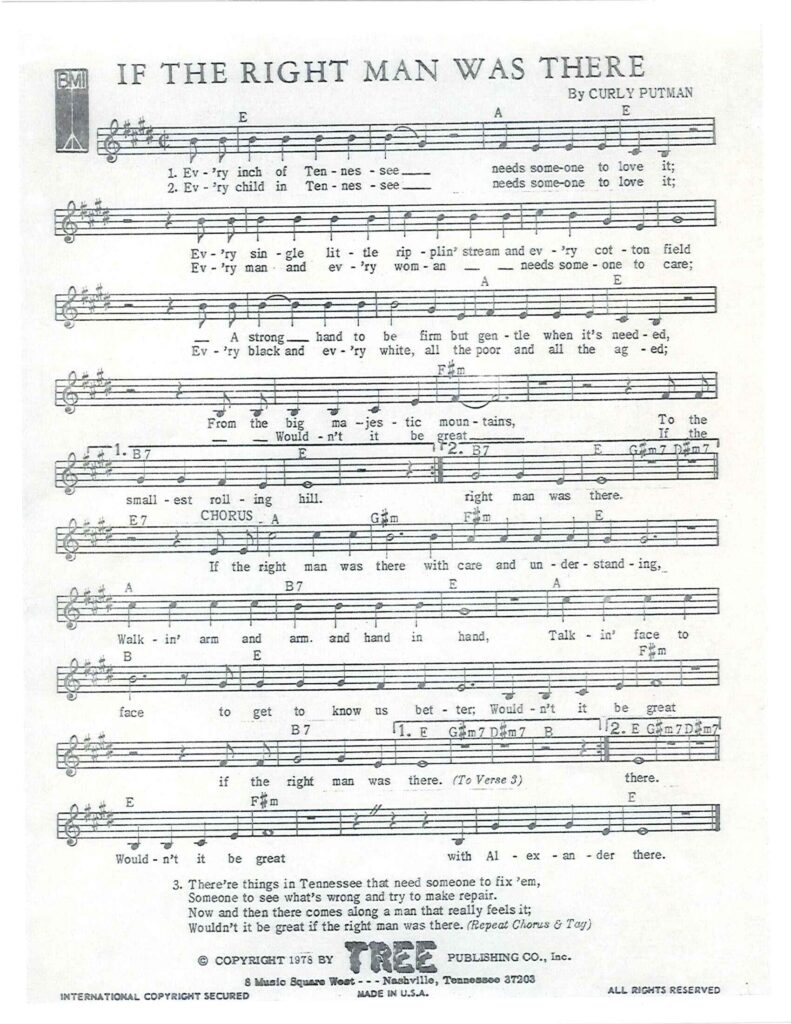
Another song from his gubernatorial campaigns drew on the time-honored tradition of adapting well known songs. In this case Alexander’s campaign used the Hal Burns/Tex Ritter song “Cowtown”, a 1962 hit by Webb Pierce. The lyrics for the jingle are in the image below.

We have not yet obtained recordings for the “Cowtown” jingle or “If the Right Man Was There.” Another Alexander campaign song featuring a performance by Hank Williams Jr. has not yet been recovered.
As Lamar Alexander’s national profile grew, so did the media’s coverage of his own musical talent, particularly on the piano. One example is this National Public Radio interview in 2008 in which Alexander plays the “Tennessee Waltz” and other Tennessee-related songs. In the interview, Alexander recalls that as governor he realized that “music is about the only thing that unifies Tennessee.”
Other Recent Uses of Music in Tennessee Politics
In 1986, Miss America, Kellye Cash, appeared in television ads for Winfield Dunn’s second run for governor of Tennessee. The campaign’s theme and jingle was built around the phrase “It’s Tennessee’s moment. It’s Tennessee’s time.” Cash was later required to cease appearances in support of Dunn due to the Miss America organization’s mission statement to remain non-political.
The 1994 senate race between Democratic incumbent Jim Sasser and Republican Bill Frist was “ferocious,” as the Tuscaloosa News reported in November of that year shortly before the votes were cast. Frist had spent the fall campaigning around the state in his tour bus followed by a “dump Sasser” dump truck. Frist’s campaign used the song “The Ballad of Liberal, Taxing, Two-Faced Jim.” The tune was described as similar to Johnny Cash’s classic “Boy Named Sue,” and featured lyrics such as “You ran up a tab, sent us a bill/If the taxes don’t get us, the criminals will.” Bill Frist was later the target of a parody song using the melody from Frosty the Snowman called “Fristy the Surgeon”:
Fristy the surgeon
Was elected on the phone.
With a White House boost got the Leader post.
Will he throw Trent Lott a bone?
Fristy the surgeon
Made a mint from HCA.
Rarely casts his vote for the common folk.
Wants to be the Prez some day.
In the summer of 2002, the campaign for Democratic candidate for U.S. Senate, Bob Clement, was in the process of trying to get the rights to create a parody of Fats Domino’s hit, “Blueberry Hill.” The song was to have referenced the scandal surrounding Lamar Alexander’s financial dealings with the Blackberry Farm resort in East Tennessee. The Nashville Scene quoted a possible lyric for the jingle as “It stinks like an underarm/Down at Blackberry Farm/The cash changed hands/But there was no alarm.”
Basil Marceaux (born 1952) is a colorful, perennial candidate who has run for a number of state level political offices in Tennessee. His eccentric personality and brash political statements have gained him notoriety on the national level. Basil Marceaux has appeared on the “Colbert Report” as well as a number of nationally syndicated radio shows. Basil and his wife, Getona, produced this video for his run for governor in 2010.
In the 2014 race for the Democratic gubernatorial nomination, Ron Noonan released this video showcasing his singing abilities and the beauty of Tennessee. He did not win the nomination.
If you know of other political songs and jingles from Tennessee campaigns, or can help us locate recordings or other information about the songs profiled above, please contact Kent Syler.
Follow Us!
Contact Us
Albert Gore Research Center
P. O. Box 193, 1301 E. Main St.
Middle Tennessee State University
Murfreesboro, Tennessee 37132
Main: 615-898-2632
University Archives: 615-898-5202
Director: 615-898-2633
Location
Todd Hall Suite 128
Hours
Monday - Friday
9:00AM - 4:00PM
Or by appointment
Summer Hours
Monday - Thursday
9:00AM - 4:00PM
Friday
Closed


